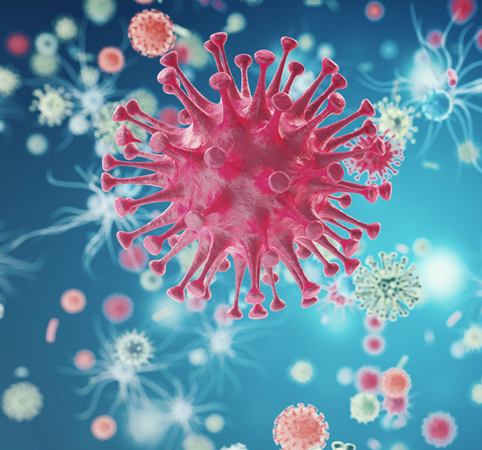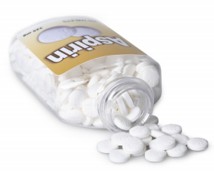
Think about the following questions.
1. What causes a cold?
2. What do you do to protect yourself from colds?
3. Do you think there will ever be a cure for the cold?
VOCABULARY PREVIEW
Match each New Academic Word List(NAWL) word with the correct definition.
- nasty _____
- accelerate _____
- enzyme _____
- antibody _____
- molecular _____
- mutation _____
- a. severe or extremely unpleasant
- b. a protein that defend the body from infection
- c. of or related to the smallest possible amount of a substance
- d. a change in the genetic material of an organism
- e. to cause to happen sooner or faster
- f. a substance produced by living cells that makes certain reactions happen
THE UNCOMMON COLD

Catching a cold is a common complaint for people all over the world. While even a nasty cold won't kill you, no one enjoys the accompanying symptoms: a sore, scratchy throat, runny nose, constant sneezing, and headaches. Colds are uncomfortable and often inconvenient, usually lasting about seven days but often lingering for up to fourteen days. On average, human adults contract between two and five colds annually, while children catch as many as six to ten.
It's no surprise that developing and selling cold medication has become big business for pharmaceutical1 companies. Each year, consumers spend billions of dollars on medicines to alleviate this recurring problem. From over-the-counter2 remedies to expensive prescription3 products, they are more than happy to hand over money for something that could help accelerate a recovery. However, most available medicines are only palliatives, meaning they may help relieve cold symptoms but do not cure the illness itself.
The fact is that, currently, there is no cure available for the common cold. Not even a suitable vaccine4 has been developed. In the case of influenza, commonly known as the flu, vaccines do exist, and getting one yearly is recommended. By contrast, the reason that a cold is so hard to vaccinate against or cure is that it isn't caused by any single disease. There are actually about 200 viruses responsible for our cold symptoms. In other words, a cold may not necessarily be as "common" as you imagine.
Each cold virus carries specific antigens—substances that trigger immune responses. Immune responses cause our bodies to create protective proteins called antibodies to fight off harmful diseases. So far, it has proved impossible to create one vaccine that can produce the disparate5 antibodies required to fight so many different antigens. Another problem is that cold viruses have the ability to change their molecular structure-in other words, to undergo mutations. That means that even if a suitable vaccine were developed, cold viruses could alter in a relatively short space of time, making the vaccine obsolete6. Even flu vaccines, which target a specific, known virus, must be updated frequently for this reason.
In the last three decades, medical research has concentrated on developing medicines to fight a family of viruses called the rhinoviruses, which are responsible for causing about thirty-five percent of all colds. In the late 1990s, researchers seemed to have some initial success with an antiviral molecule called BIRR4. This substance appeared to prevent rhinoviruses from binding with cells in our noses, thus blocking an infection—if taken just before getting sick. Unfortunately, people don't know when they are about to catch a cold, so they wouldn't have known when to take the BIRR4. As a result, research into the product was dropped in 2000.
Between 1997 and 2001, a company called ViroPharma tried to get approval to market an antiviral drug called pleconaril, which worked in a similar way to BIRR4. Studies indicated that pleconaril prevented rhinoviruses from attaching themselves to human cells by binding with the outer shell of the viral molecules. An application to commercialize an oral form of pleconaril was turned down by the Federal Drug Administration in the USA. The reason given was that the safety and efficacy7 of the drug had not been proven in a convincing manner.
There is another possible solution. In 2019, scientists found that a certain enzyme in human cells seemed to help many viruses, including cold viruses, to reproduce. This enzyme is called SETD3. To test their idea, the researchers engineered human cells to lack SETD3 and then attempted to infect those cells with various viruses. The viruses were unable to replicate themselves. This finding opens up the possibility of developing a drug that could stop cold viruses from reproducing and making us sick-though, admittedly, a great deal of work remains to be done.
For now, perhaps the safest way to fight a cold is simply to follow conventional wisdom: get plenty of bed rest, take over-the-counter remedies to combat symptoms, and drink plenty of fluids. If you do these things, your cold should be gone in seven days. Or do absolutely nothing, and it should be gone within a couple of weeks.
New Academic Word List
- pharmaceutical 1 : adj. related to the preparation of chemicals for medical use
- over-the-counter 2 : adj. sold legally without a doctor's permission
- prescription 3 : n. a note from a doctor stating what medicine you need
- vaccine 4 : n. a medicine that helps build resistance to disease
- disparate 5 : adj. not alike; cannot be compared
- obsolete 6 : adj. no longer produced or used; out of date
- efficacy7 : n. effectiveness; how well something works
READING COMPREHENSION
A ‣ Mark each statement as true (T) or false (F) according to the reading.
- One of the usual symptoms of a cold is pain in the throat.
- True
- False
- Children contract two to five colds each year on average.
- True
- False
- Around a third of colds are caused by rhinoviruses.
- True
- False
- Pleconaril cold medicine is now available in pharmacies.
- True
- False
- Over-the-counter cold medicines don't actually help.
- True
- False
B ‣ Choose the best answer according to the reading.
- What is the main purpose of the reading?
- a. To explain the difficulties in finding a cure for the common cold
- b. To describe the development of the drugs BIRR4 and pleconaril
- c. To warn readers about the negative effects of catching a cold
- d. To give advice on the best ways to combat cold symptoms
- The word they in paragraph 2 refers to _____.
- a. products
- b. consumers
- c. remedies
- d. companies
- Which is a reason that it is difficult to create a cold vaccine?
- a. Researchers are unsure how colds are spread.
- b. Vaccines must be taken just before getting a cold.
- c. The cold viruses are able to undergo mutations.
- d. Previous vaccines were shown to be unsafe.
- Why is the enzyme SETD3 important to the onset of the common cold?
- a. People who have it get fewer colds.
- b. It kills viruses in human cells.
- c. Viruses need it in order to reproduce.
- d. It allows viruses to enter human cells.
C ‣ Fill in the blanks with information from the passage.
- _____ can only relieve cold symptoms; they can't cure the illness itself.
- Colds are not caused by a single disease, making them hard to _____ .
- The antiviral molecule BIRR4 worked by _____ cells in people's noses to block infection.
SUMMARY
An introductory sentence for a brief summary of the passage is given below. Choose three more sentences to complete the summary.
First Sentence: Despite years of research, a cure for the common cold is still not available.
-
- 1 Scientists are researching ways to make flu vaccines effective against colds as well.
- 2 Although both BIRR4 and pleconaril had some promising effects, neither was found to be entirely suitable.
- 3 Colds can linger anywhere from one to two weeks, and the symptoms accompanying them can include headaches and sneezing.
- 4 There are many cold medicines currently available, but they are palliatives rather than cures.
- 5 It is nearly impossible to create a cold vaccine due to the number of viruses that can cause colds and their ability to undergo mutations.
- 6 Vaccines exist for the flu, and getting one every year is recommended.
VOCABULARY PRACTICE
Fill in the blanks with the words in the box. Change the form if necessary.
- accelerate
- antibody
- enzyme
- molecular
- nasty
- mutation
- One challenge in organ transplantation is that a patient's _____ may attack the organ as if it were an infection.
- Anyone who has ever experienced a(n) _____ paper cut knows how painful they can be.
- Amylase is an important _____ that breaks down carbohydrates into sugars.
- _____ biology is the study of physiological processes at the most fundamental level of elements and compounds.
- Microwave ovens are convenient because they _____ the cooking process.
- Blue eyes are the result of a(n) _____ that occurred in humans about 10,000 years ago.
SUPPLEMENTAL READING
Aspirin: A Darker Side

Everyone has suffered from a cold at one time or another. While we wait for a cold cure to be developed, most people simply end up taking some form of over-the-counter medication. The scary thing is that some of the medicines taken to treat cold symptoms may actually be counterproductive. For example, aspirin appears to be the perfect drug to take to fight headaches and throat inflammation, but the truth is that it can actually have adverse effects on us.
Some researchers believe that using aspirin to treat colds can increase the amount of virus you shed through nasal secretions. That means you could potentially infect a lot more people with the virus when you blow your nose near them. Another problem is that aspirin may suppress some of our immune responses and cause our noses to become even stuffier.
Several studies have also linked aspirin to the development of a condition called Reye's syndrome when used to treat children suffering from colds or flu. This condition is rare but serious, occurring in children between the ages of three and twelve. It often affects the brain or liver, causing major organ damage and, in very severe cases, death. Doctors, therefore, recommend that aspirin not be given to anyone under nineteen who is suffering from any viral illness, including the common cold.
Colds themselves may not harm us permanently, but the way we treat cold symptoms could. That means you should avoid aspirin if you are under nineteen, and if you're unsure about any other medication, you should consult a doctor.
Fill in the blanks with information from the reading.
- Although it is commonly taken for colds, aspirin can cause your nose to _____ .
- Reye's syndrome can result in _____ or death.
- If you are at all unsure about medication, it's best to _____ .

Leave a comment
Load more